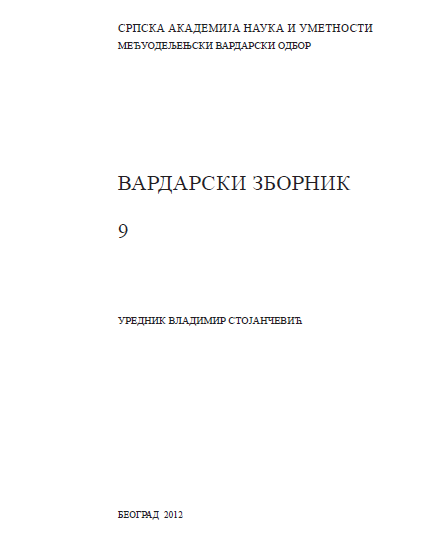ДРЖАВНА НАРОДНА ШКОЛА „КАРАЂОРЂЕ“ У КОЛОНИСТИЧКОМ СЕЛУ КАРАЂОРЂЕВАЦ, 1922–1941. Други део
STATE NATIONAL SCHOOL “KARADJORDJE“ IN THE COLONIZED VILLAGE OF KARADJORDJEVAC 1922–1941, PART II
Author(s): Dragiša KecojevićSubject(s): Cultural history, Interwar Period (1920 - 1939)
Published by: Српска академија наука и уметности
Summary/Abstract: This is the story about children who had been attending the primary national school called “Karadjordje” in their colonist village of Karadjordjevac. Settled from the different Serbian territories, the inhabitants of Karadjordjevac soon became friendly with each other and begun a successful joint life in the new surroundings. Very soon they established good connections of cooperation with the inhabitants of the surrounding villages and the county place, small provincial place of Valandovo. For the first two years, Karadjordjevac did not have its school so the pupils went on foot to then neighboring villages of Gradec and Pirava. Parents, mostly of robust Dinar type, raised their children in the spirit of love towards the school, telling them always that “the man without school is a blind man” and that the time had come when a peasant too had to be educated in order that he could secure for himself a decent life. Parents would respect the teachers and their advice on how to raise their children. Mothers followed the advice of the schoolteachers, male and female, regarding the orderliness and hygiene of the pupils. A mother would inspect each of her schoolchildren, sometimes two or three at the same time to see if they were washed properly, whether their necks were clean, whether they had washed their ears and legs and whether they had trimmed the fingernails. The children were taking their obligations seriously and were fulfilling them completely. Little did they know that this was just an introduction into a serious world in which they would come across many difficulties, and often meet with insurmountable obstacles. In the first days of their education not even their teachers knew how high some of the pupils would reach, how much the pupils would surpass the teachers in their education and social position. The school welcomed naive peasant children, brought up in the spirit of patriarchate to obey the elders, to love each other and listen to their parents’ advice. Their initial goal was to finish the primary school because they did not know of any other or higher school. They did not know then what kind of education a teacher, priest or a doctor should have and they did not even come across other professions. These children were future teachers, professors, doctors, engineers and other experts and not one of them on the first day of their school could even imagine that he would become an important figure. Their parents knew this, so they advised them to be excellent pupils, promising them that they would send them to higher education. Some of the children succeeded in being excellent pupils and some of them did succeed in finishing the highest of schools. In the difficult war times these children, now grown-ups, defended their country not sparing themselves. The mortal remains of the young men from Karadjordjevo who sacrificed themselves so unselfishly for the freedom of those who remained alive lie in different parts of Yugoslavia. Let their ashes lie in peace.
Journal: Вардарски зборник
- Issue Year: 2012
- Issue No: 9
- Page Range: 227-251
- Page Count: 25
- Language: Serbian

